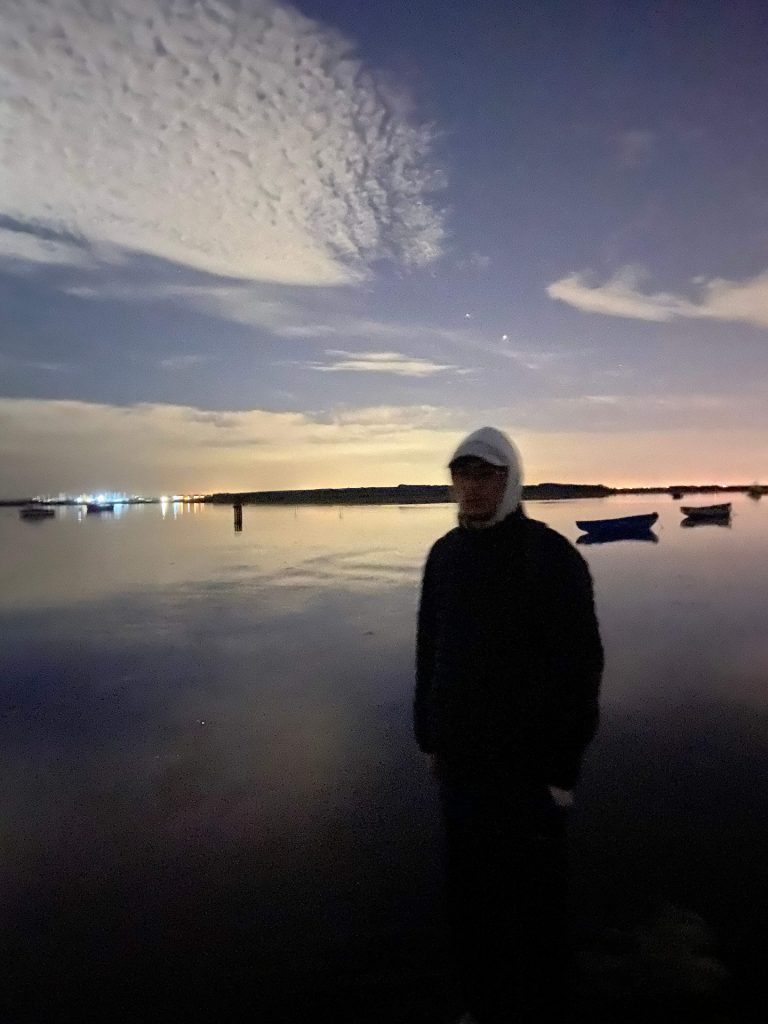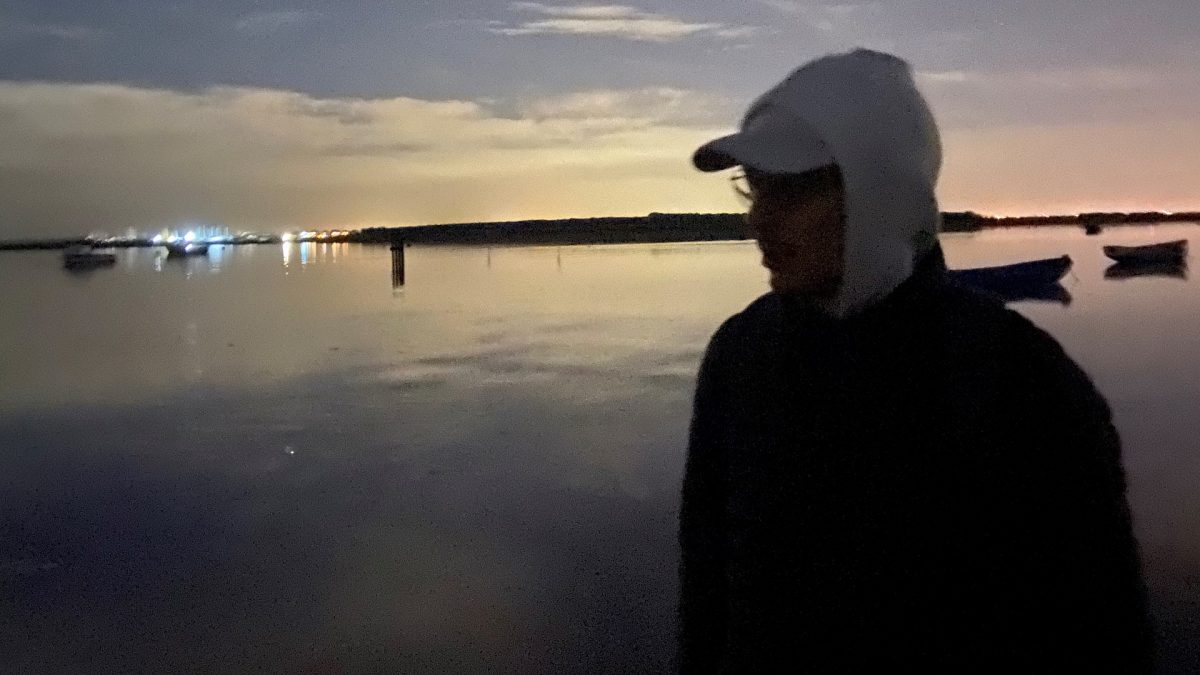『我知道尤其是現在YouTube上有各種教程,音樂製作的行業標準範本也是唾手可及,但是我寧可通過在錄製音樂時進行不同形式的DIY實驗而發展出自己的一套方法。』

I don’t think you mind other people saying that your music sounds like certain artists?
I don’t mind, no, because people inevitably say that. That’s what people do about music, don’t they?
I’m gonna say it—one of the reasons why I like your new album is because I can pick up a lot of sounds from my memories while listening to it. Songs like ‘Line (with Glasear)’ and ‘忘了一切 (with Munni)’ have that particular hi-hat sound that remind me of slowcore bands like Arab Strap, Bedhead and Codeine—not any of their songs in particular though.
Yeah, I love that kind of music for sure. I think a lot of music I made when I was a lot younger sounded a lot like those kind of bands, not exactly, but in a way. I’ll tell you that one band I used to try and copy when I was younger is Duster. There’s a song I put out on Bandcamp recently from when I was 19 or something. I made it with my friend Deva. I think it was pretty much I wanted to make a song that was similar to Duster but that’s not normally the way I make music.
Were you in a band? Or do you always make music on your own?
I’ve been in bands in my life, but never for that long. I played in a hardcore band in uni with noctilucents who now co-runs Genome 6.66Mbp and we did one awesome gig. He was the singer. It was really sick but with only one gig and short lived.
What is your new album about?
These are the songs that I made during late 2019, some of them even earlier, and then 2020. Songs that I made in that period mostly, and then eventually I felt they were an album. It’s hard for me to say what it’s about because I just think that they speak better for themselves than any explanation of what they’re about that I can give.
I can’t really hear a lot of lyrics in your songs, I know you do it sort of on purpose with your way of singing…
It’s not really on purpose anymore to be honest. That’s just naturally how I feel inclined to sing. But when I listen to it I can hear most of what I’m saying, and I think certain people I know hear my music a lot clearer lyrically now, maybe. I think the lyrics are fairly discernible in a lot of this album, but maybe people won’t necessarily agree.
I do know what you sing in ‘Li Bu Kai’ though—‘Sheng ming jiu xiang yi tiao da he (Life is like a river)’.
‘Li Bu Kai’ is probably quite hard to understand, or the other bits are at least. I would definitely more overtly slur my vocals back then out of shyness. The lyrics you quoted are from Wang Feng’s ‘Fei De Geng Gao (Fly Higher)’.
You like Wang Feng?
I do like Wang Feng a lot, yeah.
Talking about Wang Feng, the title of the album Chang Zhe Na Wu Ren Wen Jin De Ge Yao is a line from Wang Feng’s ‘Chun Tian Li’. What do you feel about this song?
I think this song is a masterpiece, it’s a really really good song.
I know my parents like this song, but I can’t seem to like it. It’s their generation’s music I think.
My dad would probably view it as young people’s music still!
Wang Feng sings about the time when he had nothing and was all alone and no one knew his music, but he sings it as a man who’s made it. So I think it resonates with the generation that experienced that social mobility. I believe a lot of people my age, who are in their early twenties, indeed like this song, but I just don’t see this song as cool.
Yeah that’s an interesting perspective on it. I understand his place in culture as something akin to U2 in the UK, ha. I understand that, I nevertheless still like it.
Why does that line specifically stand out to you?
I think it’s just talking about music in a way. He’s talking about the relationship that he used to have to his music, about doing it for its own sake. And I think it resonates. Not in a nostalgic sense even, just in a sense of being a pure and nice sentiment that speaks to what music means, or what its significance is, at heart. It’s not really about my personal relation to the narrative of the song by any means, in the sense that the narrator has ‘made it’ and looks back on his ‘simpler’ pre-fame life. But ‘Chun Tian Li’ has a sentimental value to me as a song that I heard a lot when I was a kid as well, in supermarkets or on TV. It’s a song from youth, so in that sense it’s nostalgic, but not in the sense of me relating to the specific nostalgia of the song’s narrator.
Have you listened to a lot of Wang Feng’s music?
I have gone through a bunch of his music and picked out the songs that I like. There are certain songs I remember when I was young that I liked, or not even necessarily liked back then. But they’re familiar to me, and now they’ve accrued meaning in time.
Would you agree this album is a transition from your previous music with more Dancehall, Afrobeat, and Soundcloud Rap elements to one with a more Rock aesthetic?
People might perceive it as such, but this is more like the music that I used to make when I was 17. I grew up playing guitar and I’ve really gotten back into the act of playing itself in a way I’d neglected in the past few years. So it doesn’t really feel like something new in a way. I just make what I feel like making at any given time, I suppose. I don’t agree that my output thus far can be described accurately as Dancehall/Afrobeat or ‘Soundcloud Rap’ either, really, all the attachment of those terms to my work was usually just for marketing purposes when journalists had to write about it, or else they were pinned onto me by association. I still get people writing or coming up to me as if I’m either a club producer or a ‘vocalist-for-hire’ Soundcloud Hyperpop rapper type or something because I came up in that scene, and I don’t really understand it. I think you have to have ignored or missed a lot of what I’ve made to arrive at that conclusion. I don’t agree with it, in the same way that I don’t want to present this as ‘my rock album’ because I’ve picked up the guitar again. I don’t really want my album to be instantly digestible in that way and I’d rather let it speak for itself.
There’s a song on this album, ‘Never Heard’, I find it very interesting with the clear bass and vocal and the guitar instrumental that’s supposedly a field recording?
Yeah, the guitar is a field recording, and then edited and looped. That’s why it sounds so fucked up. DAWs are cool but the richness of ‘real’ sound is unmatched.
The Microphones has a song called ‘Sand’, where one of the instruments sound quite blurry, it’s probably a field recording of that instrument as well.
In general, the way that he records music had really influenced me when I was a kid. That was the kind of approach that I tried to mimic when I started recording music for the first time. A lot of his stuff would have interesting ways of layering different instruments or panning things. He has a kind of approach to production that’s not really following…especially now because I know there are YouTube tutorials and the template for an industry standard way of producing music widely available, but I’d rather develop my own practice through different forms of DIY experimentation with the recording process.
I’ve never really sat down and learned recording techniques or software through tutorials, I just make stuff. But when I first started making stuff and experimenting with making music, I would literally try and do what he did with the panning of guitars, like hard panning two different guitar tracks each side. And also hitting the lamp in my room with a drum stick and recording that and then hitting a pillow and recording that, and then panning them and EQing in different ways to have percussive sounds. Not that he was making music exactly like that, but that was the beginning of me learning how to record music and then I just kept a similar approach. I don’t really ever watch any tutorial videos because I don’t care to really learn music production that way most of the time.
‘I know there are YouTube tutorials and the template for an industry standard way of producing music widely available, but I’d rather develop my own practice through different forms of DIY experimentation with the recording process.’
Who are your guitar heroes, apart from Phil Elverum?
Sonic Youth, Bill Orcutt of Harry Pussy, Duster, Loren Connors, Jimi Hendrix, Vini Reilly of The Durutti Column. Lots of blues rock guitar playing because my guitar teacher was a blues head, and noisy stuff in which the guitar sounds like something else.
When I was listening to your new album I indeed thought of The Durutti Column as well—I think he used the pop song framework but made it a bit off a lot of the times.
I’m perfectly happy to be compared to him because I love The Durutti Column. I guess I understand what you mean though—I think I can relate to the way his music sounds and the way elements are put together, not so much the melodies and chords, but the sounds he uses and certain compositional sensibilities.
We talked about you sampling sounds in the film Xiao Wu in your song ‘Li Bu Kai’ before*; have you done more cinema sampling in this album?
The introduction is a sample from a documentary, but most of the samples on this album like recording sounds, environmental sounds are things I recorded – some of them are really old recordings from like 2013-2015.
Do sounds in cinema influence the way you make your music?
I sampled Xiao Wu because of how much I love the sound in that film. The sound was really, really well done. It’s almost like you could listen to the audio track and still think it was good. And I do appreciate the sound design of films if it’s all good.
I never thought of cinema influence like that consciously, but now that you mentioned it, there is definitely a parallel. Anytime you hear music in a film, there’s the diegetic and non-diegetic sound at once commingling, which is something that perhaps you don’t get in recorded music all the time, but I think that a lot of my music likes to do that. So maybe it’s subconsciously influential.

Organ Tapes’ LP 唱着那无人问津的歌谣 (Chang Zhe Na Wu Ren Wen Jin De Ge Yao) is out on 28th April 2022 via worldwide unlimited, buy/listen.
*The ending of the song contains a sample from Xiao Wu—it’s actually an exchange from another film that the protagonist went to see.
If you like what you see, please consider contributing to our patreon so that we can continue to create content free of advertisement and commericals.
